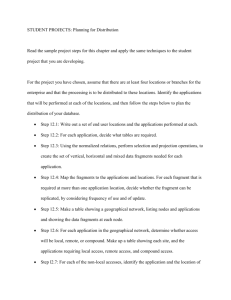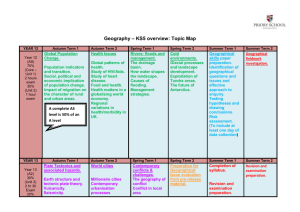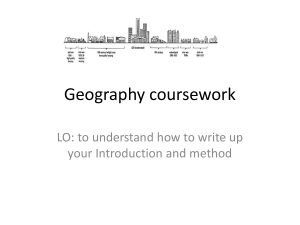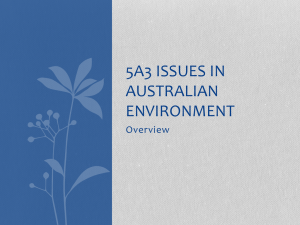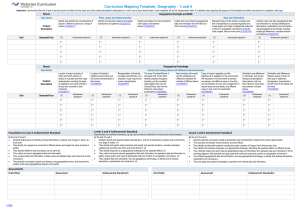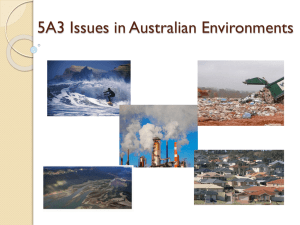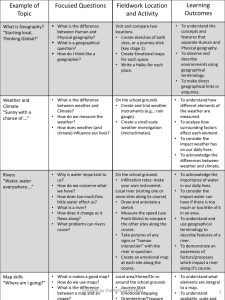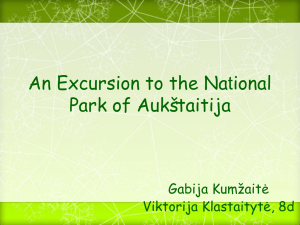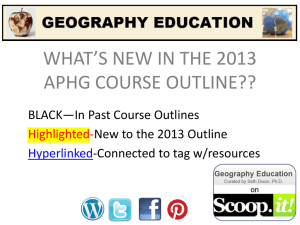Issues in Aust Environments 5A3
advertisement
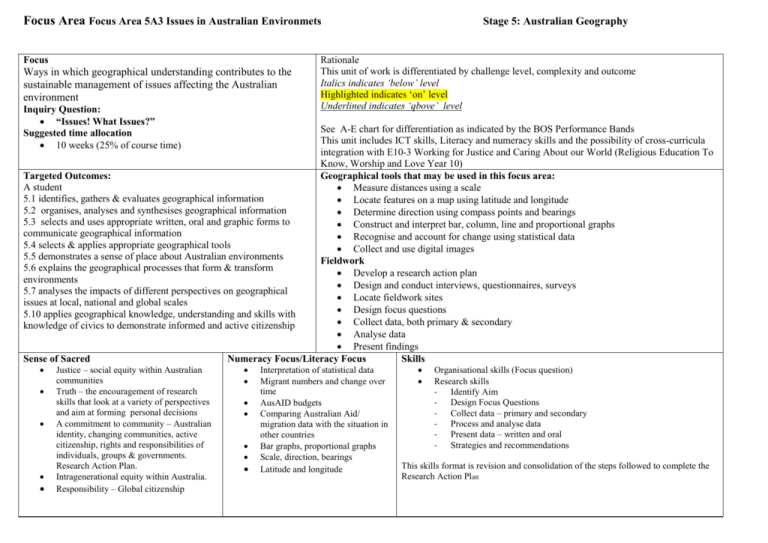
Focus Area Focus Area 5A3 Issues in Australian Environmets Focus Ways in which geographical understanding contributes to the sustainable management of issues affecting the Australian environment Inquiry Question: “Issues! What Issues?” Suggested time allocation 10 weeks (25% of course time) Stage 5: Australian Geography Rationale This unit of work is differentiated by challenge level, complexity and outcome Italics indicates ‘below’ level Highlighted indicates ‘on’ level Underlined indicates ‘qbove’ level See A-E chart for differentiation as indicated by the BOS Performance Bands This unit includes ICT skills, Literacy and numeracy skills and the possibility of cross-curricula integration with E10-3 Working for Justice and Caring About our World (Religious Education To Know, Worship and Love Year 10) Targeted Outcomes: Geographical tools that may be used in this focus area: A student Measure distances using a scale 5.1 identifies, gathers & evaluates geographical information Locate features on a map using latitude and longitude 5.2 organises, analyses and synthesises geographical information Determine direction using compass points and bearings 5.3 selects and uses appropriate written, oral and graphic forms to Construct and interpret bar, column, line and proportional graphs communicate geographical information Recognise and account for change using statistical data 5.4 selects & applies appropriate geographical tools Collect and use digital images 5.5 demonstrates a sense of place about Australian environments Fieldwork 5.6 explains the geographical processes that form & transform Develop a research action plan environments Design and conduct interviews, questionnaires, surveys 5.7 analyses the impacts of different perspectives on geographical Locate fieldwork sites issues at local, national and global scales Design focus questions 5.10 applies geographical knowledge, understanding and skills with Collect data, both primary & secondary knowledge of civics to demonstrate informed and active citizenship Analyse data Present findings Sense of Sacred Numeracy Focus/Literacy Focus Skills Justice – social equity within Australian communities Truth – the encouragement of research skills that look at a variety of perspectives and aim at forming personal decisions A commitment to community – Australian identity, changing communities, active citizenship, rights and responsibilities of individuals, groups & governments. Research Action Plan. Intragenerational equity within Australia. Responsibility – Global citizenship Interpretation of statistical data Migrant numbers and change over time AusAID budgets Comparing Australian Aid/ migration data with the situation in other countries Bar graphs, proportional graphs Scale, direction, bearings Latitude and longitude Organisational skills (Focus question) Research skills Identify Aim Design Focus Questions Collect data – primary and secondary Process and analyse data Present data – written and oral Strategies and recommendations This skills format is revision and consolidation of the steps followed to complete the Research Action Plan ICT integrated into this unit Develop and refine search techniques using the internet Access, collect and interpret electronic information Create a formatted, multi-paged report Mandatory assessment task Scenario: Many of the issues we see on our televisions, in newspapers and in everyday conversation are geographical issues. An example is: Should a resort be built near Ningaloo Reef? Key terms and concepts relevant to this unit: Geographical Issue Research Action Plan Spatial Dimension Ecological Dimension Active Citizenship Contrasting Perspectives Social Justice and Equity Sustainability Fieldwork Global citizenship These issues affect physical & human environments & need careful Major Geographical Issues: management by individuals, groups & Air Quality governments working towards a Land & Water Management sustainable & equitable future. Coastal Management Urban Growth & Decline Each student will research an issue Spatial Inequality affecting an Australian environment, Waste Management focusing on the varying responses of (as per syllabus) individuals, groups & governments and present a responsible & informed solution or solutions to the issue. Each student will present their research to the class. The theme of the research is:: ‘Issues! What Issues?’ General performance descriptors source: Board of Studies The general performance descriptors describe performance at each of five grade levels: Criteria Descriptors – to be used in conjunction with marking rubric A The student has an extensive knowledge and understanding of the content and can readily apply this knowledge. In addition, the student has achieved a very high level of competence in the processes and skills and can apply these skills to new situations. Above level performance Report is effectively organised and communicates extensive knowledge and understanding The presentation to the UN Conference will allow students to apply their knowledge and skills in a new situation B The student has a thorough knowledge and understanding of the content and a high level of competence in the processes and skills. In addition, the student is able to apply this knowledge and these skills to most situations. On level performance Report is effectively organised and communicates thorough knowledge and understanding and high level of competence in the processes and skills C The student has a sound knowledge and understanding of the main areas of content and has achieved an adequate level of competence in the processes and skills. Report is organised and communicates sound knowledge and understanding and an adequate level of competence in the processes and skills D The student has a basic knowledge and understanding of the content and has achieved a limited level of competence in the processes and skills. A basic report communicates some knowledge and understanding and a limited level of competence in the processes and skills E The student has an elementary knowledge and understanding in few areas of the content and has achieved very limited competence in some of the processes and skills. Below level performance The report indicate elementary knowledge and understanding and limited competency in processes and skills Outcome 5.1 identifies, gathers & evaluates geographical information 5.2 Organises, analyses and synthesises geographical information 5.3 selects and uses appropriate written, oral and graphic forms to communicate geographical information 5.4 selects & applies appropriate geographical tools 5.5 demonstrates a sense of place about Australian environments 5.6 explains the geographical processes that transform environments 5.7 analyses the impacts of different perspectives on geographical issues at local, national and global scales Students learn about Students learn to Integrated teaching, learning and assessment Evidence of learning/feed back Geographical issues Geographical issues affecting Australia’s physical environments including: Describe each geographical issue in relation to: - its nature Focus 1: Physical Issues 1. Students define relevant terms. - air quality - coastal Management - land and water management - its impact - the responses by individuals, groups and governments to the issue Outline how a range of geographical issues are affecting Australian environments Briefly define terms and processes relevant to air quality, coastal management and land and water management. Ensure that students understand all definitions and terms. Students to categorise these definitions into relevant issues. Case Study: Coastal Management Students to define and draw diagrams illustrating coastal geomorphology eg deposition, erosion, transport. Students draw a flow chart to follow the journey of a sand particle through the various processes. Students to illustrate the various landforms found in coastal areas. Review the concept of perspectives and stakeholders, competing landuse options. Scenario: Students are given a map with a hypothetical coastal settlement that is subject to a development proposal. Students are to consider the following roles (depending on class size): resident, surfer, commercial fisherman, local conservationist, RTA, tourist operator, oyster farmer, retail operator. The development proposal is to build a major resort/shopping complex with access roads. Stakeholders are to prepare their arguments, proposals and possible compromise positions. ICT place a summary of each stakeholder position on an individual page of a hypothetical website. They are to attempt to reach an agreement or partial compromise prior to the council meeting. An arbiter is appointed and each group/person argues their case. 2. Students are able to use glossary. 3. Students demonstrate an understanding of processes by drawing a flowchart 4. Students able to examine issue from a variety of perspectives. 5. Students able to reach a compromise position through critical debate and active listening. 6. Students demonstrate an understanding of consequences arising from the decision-making process in both the short and long term. Evaluation Completion date Above level: Can list and discuss an extensive range of physical geographical issues affecting Australia. On level: Is able to list and describe the major geographical issues affecting Australia. Below level: Can list and describe some geographical issues affecting Australia 5.2 Organises, analyses and synthesises geographical information - Geographical issues Geographical issues affecting Australia’s human environments including: 5.3 Selects and uses appropriate written, oral and graphic forms to communicate geographical information 5.7 Analyses the impacts of different perspectives on geographical issues at local, national and global scales 5.9 Explains Australia’s links with other countries and its role in the global community 5.10 Applies geographical knowledge, understanding - spatial inequality - urban growth and decline - waste management Explain the interaction of the physical and human elements of the environment Recognise the responsibility of the levels of government to the issue Propose actions that promote: - sustainability - social justice - equity Evaluate the success of individuals, groups and the levels of government in managing the issue Focus Area 2: Human Issue Briefly define terms and processes relevant to spatial inequality, urban growth and decline and waste management. Ensure that students understand all definitions and terms in glossary. Students to categorise these definitions into relevant issue. Students to examine social justice issues related to spatial inequality. Case Study: Fieldwork and Report You are a concerned citizen. You have decided to investigate and collect information about a geographical issue and write a detailed report to your appropriate government representative. 1. Start your investigation process by developing a research action plan that will outline the following: * an hypothesis * four broad focus questions * the types of primary and secondary data required to answer the focus questions * how you are going to collect the data * how you are going to process and analyse the data collected (graphs, tables, maps etc) Note: make sure that your focus questions cover the following pieces of information: * the geographic process (including the interactions between human and physical elements) * individual, group and government responses & responsibilities 1. Students demonstrate an understanding of the impact of national decision making on local issues 2. Students demonstrate an ability to develop a RAP. Students apply a variety of fieldwork techniques. 3. Students demonstrate an ability to manipulate data and present in an appropriate format. 4. Students demonstrate active citizenship by proposing individual action to address the issue (report to responsible government department) and skills with knowledge of civics to demonstrate informed and active * management processes, strategies and an evaluation of their success 2. Provide information about the area to be studied, including: - a photograph - a map - description of physical features/landforms - a brief description of how the issue related to the location 3. Investigate the issue by following the steps outlined in your research action plan 4. Develop and present your report about the issue Above level: Able to show depth of knowledge and sound research skills to summarise Australia’s geographical issues. Familiar with glossary words and can use the metalanguage. Cartoon analysis require high order thinking skills. On level: Able to identify and explain some issues. Increase in understanding of relevant geographical terms. May only interpret the cartoon literally Below level: Can describe some of Australia’s geographical issues. Has a limited knowledge of relevant geographical terminology. Above level: This assessment task requires deep knowledge leading to a synthesis of data and creation of recommendations. Students are required to create an hypothesis, plan their own focus questions and develop strategies for the collection, analysis and presentation of their findings. Students should be showing responsibility for their learning and independent research skills. Students will be able to evaluate contrasting perspectives of key interest groups and the implications for social justice and sustainability. On level: Students may need assistance with developing 4-6 Focus Questions. Steps 1-4 should be attempted Below level: 1-4 Focus questions completed at a basis level. Steps 1-3 attempted

